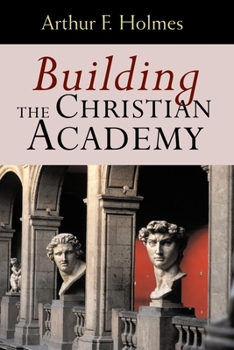Building the Christian Academy
Select Format
Select Condition 
Book Overview
This is a print on demand book and is therefore non- returnable.
Format:Paperback
Language:English
ISBN:0802847447
ISBN13:9780802847447
Release Date:February 2001
Publisher:William B. Eerdmans Publishing Company
Length:128 Pages
Weight:0.25 lbs.
Dimensions:0.3" x 6.1" x 9.0"
Customer Reviews
1 rating
BUILDING EDIFICES, INSTITUTIONS, OR LIVES?
Published by Thriftbooks.com User , 22 years ago
Dr. F. R. Bosch an apologist, researcher, and lecturer who integrates [Biblical] faith and knowledge, is a full-time university professor in Southern California, U.S.A.Prof. Arthur F. Holmes is to be commended for undertaking this immense project, and being able to narrow it down to nine chapters, and one-hundred and nineteen pages. That is a feat in itself. Considering the breadth of the subject, this is a good abridged and succinct overview of the unfolding historical, philosophical and environmental events of the western Christian Academies. The book focuses on the earlier historical evolution of higher education, while briefly addressing contemporary discussions, practices, and the state of present Christian Academies (colleges/universities).Holmes' book stimulates interactive reading. It perhaps generates more questions than there are answers. This being the case, some may think that the book fails to discuss the pertinent areas fully. Others, may believe that the subject is dealt with from a too narrow perspective, or perhaps the topic could have been addressed from several Christian traditions, allowing the reader to gain a more comprehensive understanding of the subject.In the next to last page, Prof. Holmes advises that Christian Academies "must return to the liberal arts" in an effort to educate and prepare the whole person. To accomplish this "Christian scholarship must be cultivated, and we must focus on the theological foundations of learning." This sounds good. However, if the "right combination" of what is being proposed could have been found and applied in the earlier Christian Academies, we would have the near-perfect combination today or its derivation. Instead, today's Christian Academies (colleges/universities) are trying to figure out the right combination.It seems that Christian Academies need to reevaluate and revisit their original reason for being. That is, their commission statements, their vision statements, and their mission statements. There may be a need to find understanding of what it means to be in the world, yet not being worldly. It would also seem prudent to consider what it means that our thoughts are not God's, thus our ways are not His. As an ancient wise man said - We can prove all things, but is the Lord convinced? The connotation of "building" in the title of the book conveys the thought that there is a [lasting] foundation that weathers the ideological and theological storms of time. The proposal of the Liberal Arts being the means to offer a "rounded" preparation - an education that ultimately leads students to become God-cognizant and make God-connections seems idealistic. Liberal Arts education alone is not going to cause students to make a God-connection. The history of Christian and non-Christian liberal arts colleges and universities have sufficiently demonstrated this.It seems more prudent and realistic to advocate that a Liberal Arts education that takes place in the Christian context, where the






